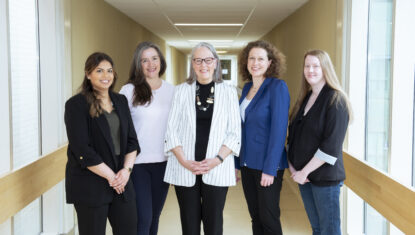11/04/2025
Ottawa, Ontario — Friday April 11, 2025

As many as 50% of children and youth with mental health conditions do not respond to traditional treatment methods. The precision approach to mental health care aims to address this by bringing together researchers, clinicians, data scientists, patients, and caregivers to find treatments that work for each individual.
A research team from the Precision Child and Youth Mental Health (PCYMH) Collaboratory at the CHEO Research Institute, recently published a study in the Archives of Clinical Neuropsychology demonstrating that a precision mental health intervention in the CHEO Outpatient Mental Health Service was feasible, well-accepted by patients, families, and providers, and did not disrupt the flow of care. The results are foundational in supporting the launch of a full-scale study to examine clinical outcomes of this innovative approach to improving mental health care through greater precision in treatment.
The intervention measured the unique cognitive profile of brain function in each new patient before they started treatment. This brain function signature was then used to help providers tailor their treatment plans to take advantage of a person’s cognitive strengths, while accommodating any weaknesses.
“This approach could revolutionize how we address mental health care for our youngest populations,” said Dr. Kathleen Pajer,Director of the PCYMH Collaboratory and co-investigator on the study. “By moving away from the ‘one-size-fits-all’ approach, we’re working on creative ways to offer more effective treatment for children and youth, truly placing their unique needs in the center of their care plan, improving outcomes and empowering families.”
Self-report data showed that 83% of patients and 94% of caregivers found the neuropsychology-informed approach highly valuable, some caregivers saying that the experience was “transformational” in the lives of their children or youth. Clinical practitioners shared similar feedback, with 91% indicating the project added value to their care and many requesting that it become part of routine care.
“Through this innovative research, we have demonstrated that precision child and youth mental health treatment is highly valued by patients, caregivers, and practitioners alike,” said Dr. Jason Berman, CEO and Scientific Director, CHEO Research Institute and Vice President Research, CHEO. “We are excited to see its potential for further clinical trials and its integration into mental health treatment both nationally and globally.”
The Precision Child and Youth Mental Health (PCYMH) Collaboratory
The PCYMH Collaboratory aims to transform care by combining research, data, and technology to create personalized mental health interventions. With a focus on impactful research, building interdisciplinary teams, and expanding precision mental health care both locally and globally, the PCYMH Collaboratory aims to improve the mental health of children and youth by designing care that considers the whole child.
“The goal is to detect mental health disorders sooner and provide better, tailored treatments to improve long-term outcomes for each child and youth,” said Dr. Pajer.
To continue advancing this research, the recently established PCYMH Collaboratory will focus on supporting the collection of innovative data, advancing PCYMH methods such as artificial intelligence and comprehensive data, translating research into clinical practice, and expanding clinical trials. The PCYMH Collaboratory will also develop strong, integrated networks of patients, caregivers, clinicians, and scientists to co-develop and disseminate research findings and clinic-based interventions within the Ottawa region and beyond. This transformational work, which is being done in collaboration with SickKids, was made possible thanks to the generous funding from the Waverley House Foundation and additional partners through the CHEO Foundation.
For more information or to inquire about opportunities to collaborate, please contact p[email protected].
